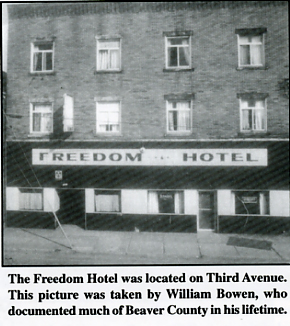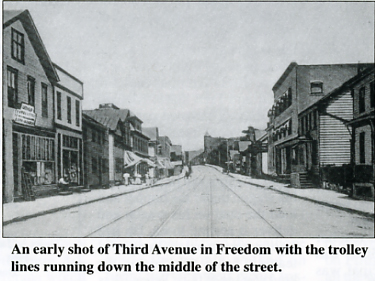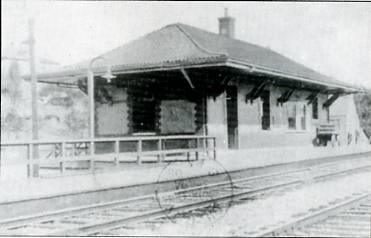
Click Here to Return to Milestones
Roy Packer was born in Freedom in 1920. In
April of 2004 he related to me his early memories of Freedom.
His description of Freedom is a history of what Freedom was like
during those years. Roy has the ability to create a wonderful
word picture when he tells a story. I am sorry that my ability
to write is not equal.
The old trolley car line in Beaver County was known as the Beaver
Valley Traction Company. They were located half way between Rochester
and New Brighton. They had a fenced in area where they kept the
trolleys. It was called The Junction Park. It was the hub of the
trolley car line. They had a fair ground there were they would
hold the Beaver County fair each year. There was a grand stand
and a racetrack where they would have horse races. Mr. Anderson
of the Cook Anderson lumber company had a team of eight show horses.
They were beautiful tan horse similar to a Clydesdale. I believe
they were called Petron. He would enter them in the fair for judging
each year. The first streetcars in the valley had one set of wheels
in the center of the car. This would cause the car to do a lot
of balancing. Sometimes when the car was going too fast it would
hop off the tracks because of the balancing. Then they would have
to stop and everyone would get off until they got it back on the
track. They had about eight rows of seats. The back of the seats
could be moved from one end to the other. So when the car reached
the end of the line. The operator would move the backs the other
direction. This way the passengers were always facing forward.
The operator stood in the center of the trolley. He had a large
round crank that acted as an electrical rheostat. This was used
to control the speed of the electric motor. He also had a brake
lever. Mr. Snyder was one of the operators. He lived across from
the Liberty School. He had a son named Merle.

Duquesne Power Company had a large transmission tower on the West
End of Freedom. They had power lines from the tower that was strung
across the river to a tower on the other side. At the base of
the tower was a large reservoir that we would swim in. We were
told not to swim there because they were afraid that some one
would get drowned, but we swam there any way.
When I was young we didn't have electric lights in the house.
We had gaslights. There were gas lines coming out of the walls.
There was a control valve and the gas line was covered with a
mantle inside a glass globe. My older brother Howard wired our
house for lights about 1926. In those days they ran two separate
wires: a black and a white wire. The wires were run between porcelain
holders. We just had the house wired for ceiling lights at that
time. We did not have electrical plug outlets.
Capt. Riggs was in charge of the River Locks; later it was Capt.
Kronk. The Locks Captain lived in one of the dam houses. The other
house was for the equipment that operated the dam gate. My Uncle
Bert worked as a gatekeeper. The gatekeeper would put up the wickets.
When the wickets were up, it created a dam and raised the level
of the water. The wickets were similar to boards hinged together.
They rested on the bottom of the river when they were down. When
the river was low they would raise the wickets one at a time and
lock them in place. They would do this from little boats. On the
Monaca side of the river, they had what they called bear traps.
This would allow the excess water to flow out. On the other side
of the wickets, they had locks. The boats could be raised in the
locks by pumping water into the locks. At each end of the lock
was a gate that would roll back toward the bank when open. The
boats would be raised about twelve feet when coming up the river.
It would take about half an hour to raise the boat. Then they
would open the gate and the boat would go out. Below Pittsburgh
was the Emsworth dam, then the Freedom Dam and below that was
the Montgomery Dam. The dams were spaced about seven miles apart
to keep the river navigable.
There were two barbers in town. Budder Headland's shop was between
the bank and the Moose Lodge right across the street from Thompson
Drug store. Clayton Carver had his barbershop in the parlor of
his house on Third Avenue. Adam Kuhl's tailor shop was between
Isley's Ice Cream and the A&P Store. Adam Kuhl was the tailor
and his partner was Jake Hetche. Jake would go to Pittsburgh and
buy material. Jake Hetchie would sell suits, shirts and pants
and things in the front of the store and Adam Kuhl would do tailoring
and repair work in the back of the store. Frederick Metzger was
down near High Diggers. He was a W.W.I veteran who did jewelry
repair. Mails and Powell had a tin roofing shop. They did roof
repair, flashing and stove pipes.
Dad Wadsworth operated Dad's Pool & Beer on the corner of
Third Avenue and Fifth St. Dad was a friendly robust man. I remember
him sitting out on his stoop with a white apron on. I would walk
by and say, "Hi, Dad." Everyone would call him Dad.
He would say, "Hi, Jimmy" He called everyone Jimmy.
Catrona had a shoe repair shop west of Sixth Street. His son Joe
Catrona was a real good football player in high school. I believe
he played football in college. His daughter, Mamie Catrona, worked
at the A&P in Freedom. Carl Deluca had the other shoe repair
shop in Freedom. It was located on Third Avenue next to Dutchman's
Run.

Mengel's Nash Garage was at the corner of Sixth Street and Third
Avenue. They sold and repaired Nash automobiles. They had an entrance
on Third Avenue where you could drive your car up a ramp and park
on the second floor. That is where they did repair work. Sonny
Yost was the mechanic.
Sam Snead had a grocery store and he would go around door to door
taking orders. Then in the afternoon they would deliver what you
ordered. We dealt with Sam Snead for groceries We would buy our
meats from Sam Balter's butcher shop.
At the corner of Sixth Street and Third Avenue was the Freedom
National Bank and Post Office. Across the street on the same side
of Third Avenue was Lee B. Cain's law office. Next to that was
the Barn and Feed Store. Next to that and west was the Charlie
Hetche Home. West of that was Dr. Cloak's brick house. West of
that and on the corner of Fifth Street and Third Avenue was a
store with apartments.
Back Eight Street, about a half block off Third Avenue was the
police and fire station. About once a year the fire department
would have a competition with one of the fire departments from
a near by city. They would have what they called a water battle.
They would have a four to six man hose team competing against
the rival city's team. They would draw a line in the center of
the street. They would squirt each other with the fire hose. The
team that was able to cross the line would win. The hose pressure
was so great it would tear their shirts and knock them down. Each
team would have one person on the side that would give them directions.
The guys on the hose would have to turn their heads so they needed
the Captain to give them directions. Sometimes they would squirt
the Captain and knock him down. Spukey Catrona and one of the
Holsingers worked there. People would come from all over the town
to see the water battle. They would go from town to town and compete
for championship hose team. Across from the fire station was a
large building with a cobble stone front. Adam Kuhl had his house
on Eight Street. Hun Fair had a barber shop. Across the street
from Adam Kuhl was the IOOF Lodge. Schleiter Monument Works was
at the end of Eight Street. Across the street from the monument
works was the casket works. On up Eight Street was a lumber mill
owned by Charles Haniey. Maurice Glotfelty lived near the Monument
Works. He had two pretty daughters. There was a slaughterhouse
back past the Monument Works.
I remember there were some large turtles up Dutchmen Run. The
Gredels lived near us. They would sometimes bring home a turtle
and make turtle soup. Then they would make sewing baskets out
of the turtle shells. I remember my brother Richard once brought
one home that was as big as a bucket.
My first grade teacher was Mrs. Yugo. Mr. Gross was the janitor.
The principal was Raymond Robertson. There was probably some one
before him but I don't recall the name. In High School Ada Jackson
was the principal. Bill Storer was the coach. Morty Howel, Dick
Fruth and Charlotte Walker were teachers. I was in the boys' chorus
in high school. We went to the Scottish Rights Cathedral in New
Castle to sing. That was the big event of the year for us.
Cora Blackledge, was the juvenile officer, and she threw the fear
of God into all the kids. Nothing could frighten kids more than
to be told Cora, was after them. A lady we called Black Betty
sold numbers, a form of gambling. A black man named "Uncle
Charlie" had been a slave. Gypsies lived in a shack on 3rd
Ave next to Dad's Pool Hall. Rumors were that they stole boys
and sold them. I never walked on that side of the street.
Our old ice man was Vincent Fash, He would deliver ice to your
house in a wagon pulled by a horse. He would cover the ice in
the back of the wagon with a tarp so it wouldn't melt. When he
got to your house he would chip a block of ice the size of your
ice box and then carry it with a pair of ice tongs into the house
and put it in your ice box. While he was in the house, we would
take some of the ice chips from the back of the wagon to suck
on. The Ice house was on Eight Ave., near where Elias Mengel had
his stable and feed store. Mengel would get a railroad car filled
with the Champion Coal, that was the best grade. The hopper would
be parked beyond the freight station, and he would pull his wagon
under the hopper and load the coal on his wagon and deliver it
around town. He had two wagons with beautiful teams of heavy workhorses,
the kind you see at fairs. When Elias would have a delivery up
on the Freedom hills, he would schedule two loads, using both
teams to pull up the hill; leaving one wagon at the bottom, he
would then return the teams to get the second load. I would watch
as the horses struggled with the load, their feet slipping on
the bricks. Elias would beat the horses to make the hill. Horse
flies would bite the horse so bad the blood would run and attract
more flies. Elias Mengel was a big strong brute of a man.
The first movie theater that I remember in Freedom was between
Eight and Ninth Street. In Rochester there were two movies on
New York Avenue, the Home and the Colonial theaters. They were
strictly westerns. Then later they opened the Majestic on Brighton
Avenue and later still they opened the Oriental.
My first ride in a car was in Bill Fraser's Dodge Victory Six.
He would come to pick up my sister Helen and take her for a drive
and let me go along. It was a deep maroon red color. I remember
it had metal louvers on the back windows so when you rolled the
widows down the air wouldn't blow in on you. Bill was really proud
of that car.
On Memorial Day we would all meet at the school. The High School
Band would line up. The Veterans would hand out small American
flags to the kids. Then we would all march off to Oak Grove Cemetery.
The veterans would lead the march, and the kids and everyone else
would fall in behind the band. At the cemetery one of the upper
grade boys would recite the Gettysburg Address. They didn't have
a sound system, but the boy would stand up on the platform and
recite the Gettysburg Address. Then the Veterans would give a
speech and fire a salute with their rifles across the veterans'
graves. I remember that Fay Tolbert and Bill Zinkham and a few
other veterans would be dressed in their W.W.I uniforms with the
leg wrappings and all.
We called it the Freedom Day Picnic. It wasn't just a school picnic.
Just about everyone in the town would go. They would close the
stores, schools and everything. A big stern- wheeled riverboat
called the Majestic would anchor at the end of Eight Street in
the river. The stern-wheeler had an arm attached to each side
of the paddle wheel. Every time the engine moved one of the arms,
a puff of smoke would come out of the one stack. When the other
arm moved a puff would come out of the other stack. On the upper
deck was the steam calliope. The man would sit at the calliope,
and every time he pressed a key steam would come out of one of
the pipes. So you would hear the music and see the steam at the
same time. They would lower a gangplank so you could walk on board.
They played the calliope while the people walked on board carrying
their picnic baskets. They would play tunes like "Happy Days
Are Here Again." You could hear it all over town. When the
boat was all loaded, they would paddle wheel down the river to
Rock Springs Park. That was near Chester, West Virginia. They
had a nice amusement park there. I think they had two roller coasters
and all the rides an amusement park would have. We would have
a nice day at the park and a picnic lunch and return in the evening.
The boat would get back just after dark.

Freedom's Street Commissioner was Andrew Belingham and his assistant
was John Acree. They use to go around in a truck and repair the
streets. Freedom had an all Volunteer Fire Department. Sam McCall
was the justice of the peace, and A. M. Reed was the constable.
He would make arrests and give citations. Rockenstein was the
burgess and mayor.
The Oil Works would enter a float in the county parade. They would
work on that float for several weeks. Joseph Craig was the president
of the Oil Works. Albert Gradel was a foreman for Oil Works distillery.
He was a stout man with a thick German accent. Freedom Oil had
a bull dog as its trademark. Their motto was, "Let a bulldog
guard your engine."
George Fresh had a farm on the West End of Freedom going toward
Unionville. His cows would pasture down right next to our back
yard on Fifth Avenue. His farm went all the way out to Korman's
farm about two miles out. I remember George Fresh would wrap his
feet in burlap when he was walking in the snow to keep his feet
from freezing. He would deliver milk. My mother would leave the
milk can on the porch and George would come by and ladle the milk
into our milk can and then put the stopper in the top.
Everyone made jokes about the steep hills in Freedom. I think
my dad best described Freedom when he would say, "Freedom
would be a wonderful place if some one would just level off all
those damn hills."